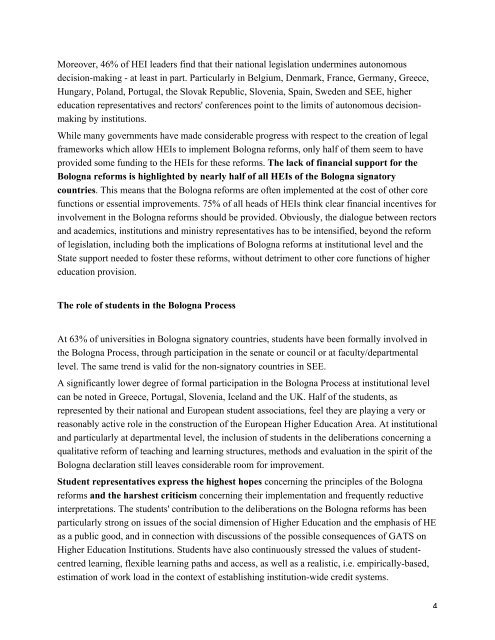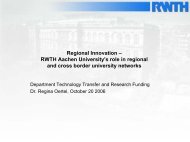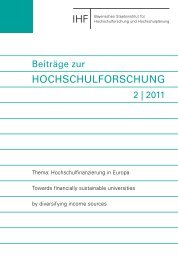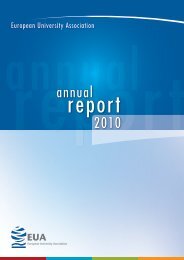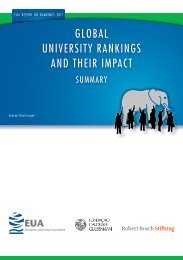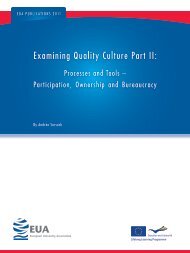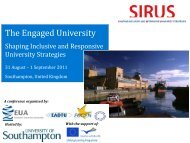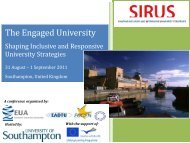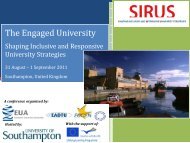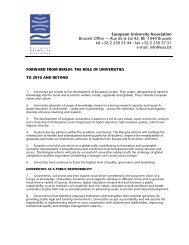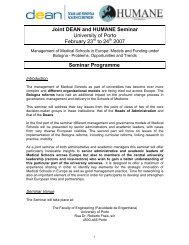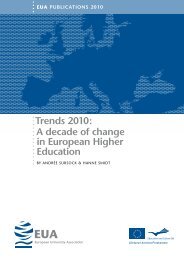Trends 2003 Progress towards the European Higher Education Area ...
Trends 2003 Progress towards the European Higher Education Area ...
Trends 2003 Progress towards the European Higher Education Area ...
Create successful ePaper yourself
Turn your PDF publications into a flip-book with our unique Google optimized e-Paper software.
Moreover, 46% of HEI leaders find that <strong>the</strong>ir national legislation undermines autonomous<br />
decision-making - at least in part. Particularly in Belgium, Denmark, France, Germany, Greece,<br />
Hungary, Poland, Portugal, <strong>the</strong> Slovak Republic, Slovenia, Spain, Sweden and SEE, higher<br />
education representatives and rectors' conferences point to <strong>the</strong> limits of autonomous decisionmaking<br />
by institutions.<br />
While many governments have made considerable progress with respect to <strong>the</strong> creation of legal<br />
frameworks which allow HEIs to implement Bologna reforms, only half of <strong>the</strong>m seem to have<br />
provided some funding to <strong>the</strong> HEIs for <strong>the</strong>se reforms. The lack of financial support for <strong>the</strong><br />
Bologna reforms is highlighted by nearly half of all HEIs of <strong>the</strong> Bologna signatory<br />
countries. This means that <strong>the</strong> Bologna reforms are often implemented at <strong>the</strong> cost of o<strong>the</strong>r core<br />
functions or essential improvements. 75% of all heads of HEIs think clear financial incentives for<br />
involvement in <strong>the</strong> Bologna reforms should be provided. Obviously, <strong>the</strong> dialogue between rectors<br />
and academics, institutions and ministry representatives has to be intensified, beyond <strong>the</strong> reform<br />
of legislation, including both <strong>the</strong> implications of Bologna reforms at institutional level and <strong>the</strong><br />
State support needed to foster <strong>the</strong>se reforms, without detriment to o<strong>the</strong>r core functions of higher<br />
education provision.<br />
The role of students in <strong>the</strong> Bologna Process<br />
At 63% of universities in Bologna signatory countries, students have been formally involved in<br />
<strong>the</strong> Bologna Process, through participation in <strong>the</strong> senate or council or at faculty/departmental<br />
level. The same trend is valid for <strong>the</strong> non-signatory countries in SEE.<br />
A significantly lower degree of formal participation in <strong>the</strong> Bologna Process at institutional level<br />
can be noted in Greece, Portugal, Slovenia, Iceland and <strong>the</strong> UK. Half of <strong>the</strong> students, as<br />
represented by <strong>the</strong>ir national and <strong>European</strong> student associations, feel <strong>the</strong>y are playing a very or<br />
reasonably active role in <strong>the</strong> construction of <strong>the</strong> <strong>European</strong> <strong>Higher</strong> <strong>Education</strong> <strong>Area</strong>. At institutional<br />
and particularly at departmental level, <strong>the</strong> inclusion of students in <strong>the</strong> deliberations concerning a<br />
qualitative reform of teaching and learning structures, methods and evaluation in <strong>the</strong> spirit of <strong>the</strong><br />
Bologna declaration still leaves considerable room for improvement.<br />
Student representatives express <strong>the</strong> highest hopes concerning <strong>the</strong> principles of <strong>the</strong> Bologna<br />
reforms and <strong>the</strong> harshest criticism concerning <strong>the</strong>ir implementation and frequently reductive<br />
interpretations. The students' contribution to <strong>the</strong> deliberations on <strong>the</strong> Bologna reforms has been<br />
particularly strong on issues of <strong>the</strong> social dimension of <strong>Higher</strong> <strong>Education</strong> and <strong>the</strong> emphasis of HE<br />
as a public good, and in connection with discussions of <strong>the</strong> possible consequences of GATS on<br />
<strong>Higher</strong> <strong>Education</strong> Institutions. Students have also continuously stressed <strong>the</strong> values of studentcentred<br />
learning, flexible learning paths and access, as well as a realistic, i.e. empirically-based,<br />
estimation of work load in <strong>the</strong> context of establishing institution-wide credit systems.<br />
4


